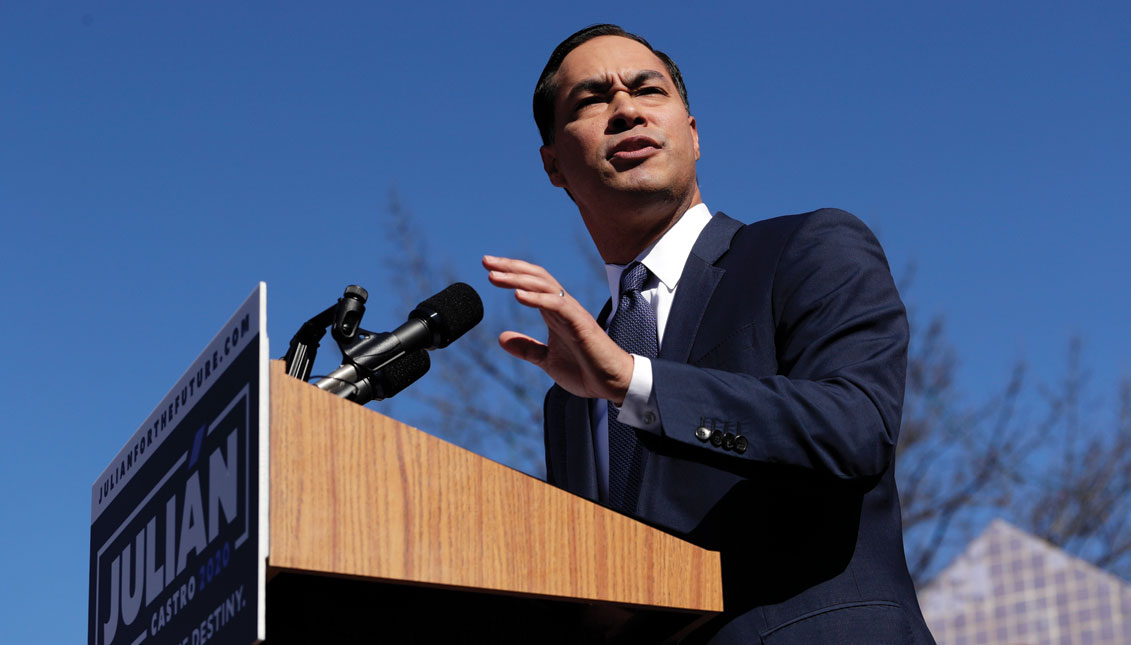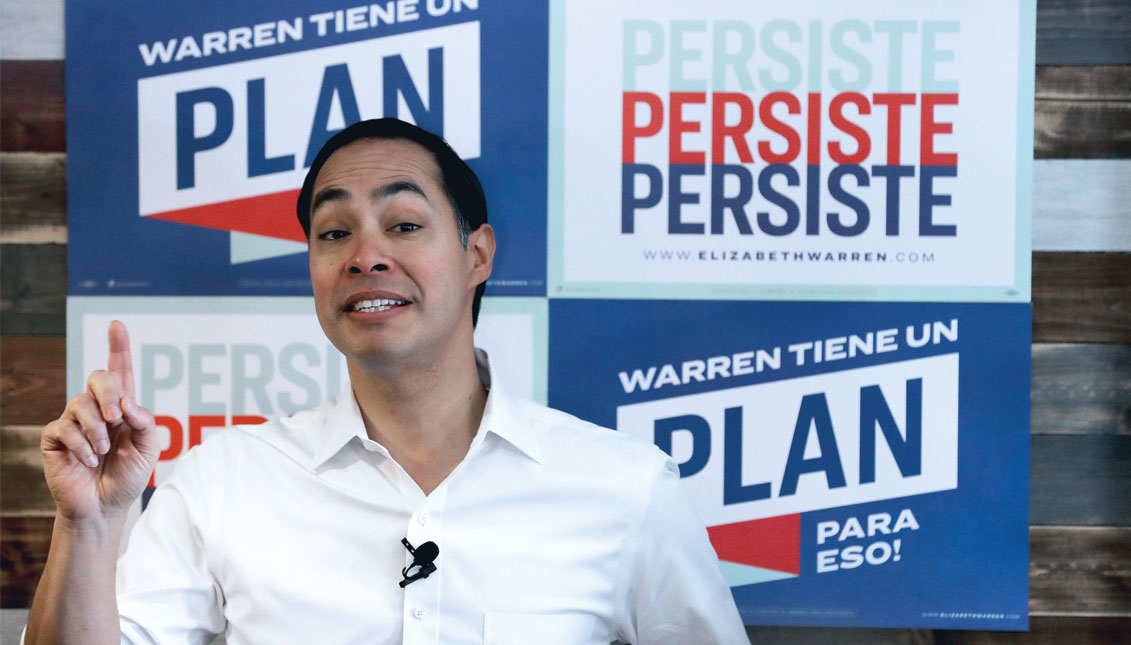
Julián Castro's Police Reform
Julian Castro warned of the need for police reform in the United States. Today, his words resound even louder.
At a time when the United States is experiencing a painful identity crisis –between protests over the right to life of people of color and the need to break with endogenous racism– no phenomenon seems to be isolated.
The deaths of George Floyd, Carlos Ingram-López, Andrés Guardado, Breonna Taylor and so many other people of color at the hands of police officers around the country have only highlighted the need for a profound transformation and a radical change in the system.
During the Democratic primaries, one candidate put this reform at the center of his electoral proposal, but his voice seemed to be lost amidst the noise of a Democratic machine that, faced with the fear of Donald Trump’s possible re-election, preferred not to take risks.
It was the former secretary of housing in the Obama administration, and the only Latino in the race, Julian Castro, who at the time was echoing the disproportionate violence suffered by Latinos and African-Americans alike when confronted by law enforcement officials.
“If police in Charleston, South Carolina can arrest Dylann Roof after he murdered nine people worshipping at Bible study, without hurting him,” he said in January 2019, “then don’t tell me that Michael Brown, and Tamir Rice, and Aiyana Jones, and Eric Garner, and Jason Pero, and Stephon Clark, and Sandra Bland shouldn’t still be alive today, too.”
Julian Castro was known in late 2018 as a young man "with some executive experience" within the Democratic Party's popularity ranks at the national level.
After serving as Secretary of Housing and Development in the Barack Obama administration, the young politician was considered to join Hillary Clinton's campaign formula in 2016, which definitely catapulted him to the front pages.
Castro and his twin brother, who currently leads the Hispanic Caucus in Congress, have framed their political career in their family history: Mexican immigrants and political activists in the heart of Texas.
At a political rally organized in January 2019 in San Antonio, Texas, and delivered in both Spanish and English, Castro said his campaign would have several priorities of his party, such as a pre-kindergarten program, expanding access to health care, fighting climate change and, not surprisingly, opposing President Donald Trump.
His experience as San Antonio's mayor gave him an advantage over other potential challengers - Elizabeth Warren and Kamala Harris, for example - and it was precisely his distance from "identity politics" that allowed his slow but steady rise.
During his campaign, Castro made a big difference with the other candidates, visiting Puerto Rico on his first stop, and proposing two radical changes in the country's legislation: an immigration proposal and comprehensive police reform, which would be merged into what he called the "People First Policy.”

In late October, Castro announced that his campaign was at risk of ending due to lack of funds, and his position in the polls –where he had a 2% approval rating– did not allow him to qualify for the November Democratic debate.
His campaign experience has made him critical of the way politics are conducted in the country, stating among other things that the tradition of first-nominating states in primaries "does not reflect the diversity of the nation," and he suggested, "rearranging the Democratic primary voting schedule" so that the most diverse states would be allowed to vote first.
Even as one of the candidates with a strong, workable and inclusive program that left no community behind, Castro was devoured by the Democratic system, where being male and white still seems to be the preferred route for those who do not understand that the country is ready to see change.
His struggle, however, has left a deep mark on the country, after his participation in the national debate put on the table the names of victims of police violence, racial inequality and lack of representation in the political system.
“I’m gonna tell the truth. It’s time for the Democratic Party to change the way that we do our presidential nominating process," Castro said in his farewell video. " I’m so proud of the campaign we’ve run together. We’ve shaped the conversation on so many important issues in this race, stood up for the most vulnerable people, and given a voice to those who are often forgotten.”
After Senators Bernie Sanders and Elizabeth Warren withdrew from the race for the presidency, the de facto Democratic candidate to run against Donald Trump in November 2020 was former Vice President Joe Biden, who was quick to incorporate some ideas from his former opponents into his campaign.
Among them, Julian’s police reform, who followed the example of many other candidates and gave his support to the former vice president in social networks.
In the midst of social discontent over the death of George Floyd and the impact of the Coronavirus pandemic on communities of color, Biden took the opportunity to thank Castro for his support and to echo his promise to make the young politician's proposal a reality.
“Julián — I made a promise to George’s family that he wouldn’t just become another hashtag. We’re going to tackle this head-on — and we’re going to need your help to do it. Grateful for your support,” Biden said in a retweet of Castro's tweet of support for Biden.
RELATED CONTENT
Julián — I made a promise to George's family that he wouldn't just become another hashtag. We're going to tackle this head on — and we're going to need your help to do it. Grateful for your support. https://t.co/D0Ssv4hU2S
— Joe Biden (@JoeBiden) June 2, 2020
Amid the nationwide uprising that triggered the second wave of Black Lives Matter protests and a profound shake-up of the status quo in the country, Biden echoed Castro's initial proposal, urging Congress to take immediate steps to reform the police, including outlawing chokeholds, ending the transfer of military weapons to police, improving oversight and accountability of police and creating a national model on the use of force.
“Joe Biden recognizes the urgent need for real reform to address our broken policing system. I’m proud to support him, and I look forward to seeing these reforms become law, so that what happened to George Floyd never happens again,” Castro said in his tweet.

The death of George Floyd and the ensuing protests by the Black Lives Matter movement went a step further and prompted calls to cut federal funds to police departments.
For Castro, the way out is much more comprehensive.
In his plan, the former candidate proposes to end violence, racism, and discrimination within police departments by establishing national standards of conduct for officers, and to make the elimination of racial prejudice a priority.
In a recent interview with The Atlantic, Castro went into more detail about what his vision entails:
“At the federal level, the most important thing is, No. 1, to support local communities in reimagining public safety, and then to take several concrete steps to prevent police violence: banning chokeholds and strangleholds, getting rid of qualified immunity, creating a database of officers that have been disciplined or terminated that personnel departments across the country are able to access that’s seamless. We have a spotty version of that now,” he told journalist Adam Serwer, adding that national coordination is needed.
“I also think that we need to give local communities the resources to transition into that reimagining of public safety and investing in mental-health professionals, social workers, and housing professionals, to deal with two groups of people that police often respond to that they shouldn’t really need to respond to the vast majority of the time: people who are homeless, who have been criminalized all over the country, and people with a mental health issue who are stigmatized as violent, but in the vast majority of cases are not.”
Finally, Castro has shown that he will not stand by and wait for his ideas to be put into action by others.
Over the past few weeks, the former candidate has launched a political action committee to support the electoral careers of candidates who support police reform and criminal justice equity.
The now-named People First Future PAC has 17 candidates and has raised about $65,000 to support groups protesting George Floyd's death in the streets.
On June 7, Castro addressed the protesters in San Antonio, Texas, stressing the importance of getting involved in the fight against police violence, and highlighting the importance of going to the polls in November.
"I said throughout my campaign that police violence wasn’t a case of a few bad apples," he repeated, "The system itself is broken.”











LEAVE A COMMENT: